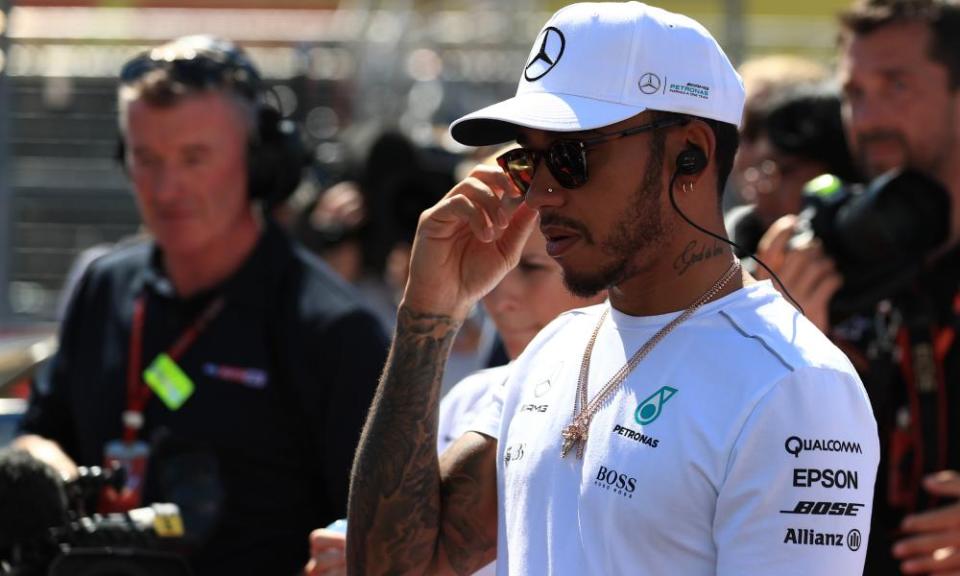Hamilton deserves credit for addressing issue whether or not he takes a knee

Lewis Hamilton is the most fascinating character in Formula One and thankfully so. It is a sport whose participants have become so stage-managed as to have hidden their personalities behind a slick corporate veneer. Hamilton has been steadfast in remaining true to himself. At the US Grand Prix this weekend, he may do so again but with potentially huge and also perhaps unexpected repercussions. If the British driver chooses to kneel during the US national anthem on Sunday, it would put him at the heart of one of the most divisive conflicts between politics and sport in recent history.
Hamilton is within touching distance of becoming the most successful British driver of all time. Should he win in Austin and his world championship rival Sebastian Vettel finishes sixth or lower, he will take his fourth title – one more than Sir Jackie Stewart. His focus will be that goal but it will have been preceded by some hard thinking about what to do when the Star-Spangled Banner is playing before he climbs into the cockpit.
The Mercedes driver has said he is unlikely to take a knee on Sunday, and is focused only on securing the drivers’ championship. Hamilton has, however, been open in his support for the protests that began when the former San Francisco 49ers quarterback Colin Kaepernick knelt during the anthem as a reaction to racial injustice and police brutality. The protests grew more widespread after Donald Trump’s condemnation.
Hamilton is the first and only black driver in F1. He has posted a series of images on Instagram referencing the protests, using the hashtag #takeaknee, and has previously suggested he would consider protesting in Austin. “I will have to start to think about it – what would be right for me to do or do I even need to get involved?” he has said. “It’s not my national anthem but the issue that is in the States ... well, it’s not just in the States, it is a global thing. It’s more focused and probably at its worst perhaps in America. I think we all do need to stand together.”
READ MORE: Formula One - It’s showtime for Lewis Hamilton as Texas hosts Grand Prix
Hamilton has expressed little interest in politics in the past but this issue has clearly chimed with him. Formula One and politics, however, have never been comfortable bedfellows. The sport was still racing in South Africa under apartheid until 1985. Its former chief executive Bernie Ecclestone has since claimed he pulled F1 out because of the regime. But in the opinion of the South African F1 journalist Dieter Rencken it was pure pragmatism. “Bernie pulled South Africa not because of any political or moral reasons but because effectively he realised it was untenable to continue to promote a race if you couldn’t get half the teams,” he argues.
Ecclestone replaced it the following year with a race in the communist-controlled Hungary and has subsequently done deals to hold races in China, Bahrain and Azerbaijan. The response from drivers and teams has remained that of sport not having a political role. This is a line comprehensively dismissed by Dr Alan Bairner, professor of sport and social theory at Loughborough University and co-editor of the Routledge Handbook of Sport and Politics.
“Sport and politics are intimately connected,” he says. “Necessarily so because it’s impossible to think that sport occupies some sphere detached from every other aspect of human society.”
Equally politicians know only too well of that connection. “Sport is one of the ways in which states market themselves,” Bairner adds. “Athletes are often proxy warriors but these same politicians are the ones who react badly if they think that someone else is using sport for political purposes. There is a hypocrisy there.”
Hamilton is not American but this does not preclude him from having an opinion. The Australian Peter Norman stood on the podium with John Carlos and Tommie Smith at the 1968 Mexico Olympics when they made their Black Power salute, and Norman wore an Olympic Project for Human Rights badge in support.
The protest reverberated around the world but with repercussions for Norman, too. He was not selected again for the Games, a decision for which the Australian parliament issued him with a posthumous apology in 2012.
Hamilton will be aware that should he kneel it may be perceived badly by some in the US but Bairner recognises that the Briton would be displaying bravery and empathy. “I would admire him for doing so, as I admire all sports people for saying: ‘We don’t just play sport, we live in the real world.’” However, Bairner issues a further note of warning.
“I would just be concerned it would do Trump more good than Hamilton would want to be accused of doing. I don’t think respect for civil rights should know or recognise national borders but in this case it may be something that Trump and his supporters seize upon to say: ‘This is the problem with the world today – America is a great country and these foreigners don’t respect it.’
“That would be the one concern. That he might be playing into the hands of the American right.”
Whatever happens, it is not a decision that Hamilton will take lightly but in an age when music and film personalities are admired for speaking out but sports people are often expected to remain silent, that he is unafraid to consider the issue and publicise it is something that should be applauded. Fourth world championship or not, he brings not only character but credit to Formula One.

 Yahoo Sport
Yahoo Sport 





































